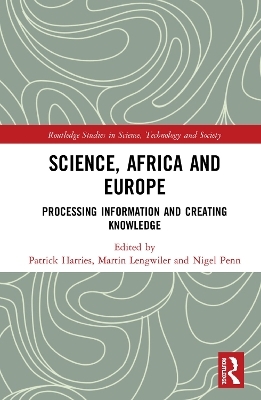
Science, Africa and Europe
Routledge (Verlag)
978-0-367-58471-9 (ISBN)
- Titel z.Zt. nicht lieferbar
- Versandkostenfrei
- Auch auf Rechnung
- Artikel merken
Historically, scientists and experts have played a prominent role in shaping the relationship between Europe and Africa. Starting with travel writers and missionary intellectuals in the 17th century, European savants have engaged in the study of nature and society in Africa. Knowledge about realms of the world like Africa provided a foil against which Europeans came to view themselves as members of enlightened and modern civilisations. Science and technology also offered crucial tools with which to administer, represent and legitimate power relations in a new global world but the knowledge drawn from contacts with people in far-off places provided Europeans with information and ideas that contributed in everyday ways to the scientific revolution and that provided explorers with the intellectual and social capital needed to develop science into modern disciplines at home in the metropole. This book poses questions about the changing role of European science and expert knowledge from early colonial times to post-colonial times. How did science shape understanding of Africa in Europe and how was scientific knowledge shaped, adapted and redefined in African contexts?
Martin Lengwiler is Professor in the Department of History at the University of Basel, Switzerland. Nigel Penn is Professor in the Department of Historical Studies at the University of Cape Town, South Africa. Patrick Harries was Professor of African History at the University of Basel, Switzerland and Emeritus Professor in the Department of Historical Studies at the University of Cape Town, South Africa. He died in 2016.
Contents;List of Figures ; List of Contributors; Preface: Tribute to Patrick Harries (1950–2016); 1. Creating Truth, Connecting Worlds: Science between Europe and Africa (introduction) Martin Lengwiler, Nigel Penn;I – Mapping and exploring;2. Peter Kolb and the Circulation of Knowledge about the Cape of Good Hope Nigel Penn, Adrien Delmas; 3. A Naturalist's Career: Hinrich Lichtenstein (1780-1857) Sandra Näf-Gloor; 4. "Nothing but love for Natural History and my desire to help your Museum"? Ludwig Krebs´ transcontinental collecting partnership with Hinrich Lichtenstein Patrick Grogan;5. The African Travels of Hans Schinz, Biological Transfer and the Academisation and Popularisation of (African) Botany in Zurich Dag Henrichsen;II – Knowledge practices between colonial and local actors;6. Mission from Cape Coast Castle to Ashantee: One work’s significance for European knowledge production about the Asante Empire Sonia Abun-Nasr;7. Tropical Soldiers? New definitions of military strength in the colonial context (1884-1914) Heinrich Hartmann;8. Disease and the Confluence of Knowledge: Kifafa and Epilepsy in Ulanga (Tanzania) Marcel Dreier;9. Standards and Standardizations: The history of a Malaria Vaccine Candidate (SPf66) in Tanzania Lukas Meier;III – International discourses, transnational circulations of knowledge;10. The Politics and Production of History on the Birth of Archaeology at the Cape (1827–2015) Tanja Hammel;11. Davos of Ghana? Local, national and international perspectives on tuberculosis treatment and control (ca. 1920 to 1965) Pascal Schmid;12. When Economics Went Overseas: Epistemic problems in the macroeconomic analysis of late colonial Africa Daniel Speich;Bibliography ;Index
| Erscheinungsdatum | 01.07.2020 |
|---|---|
| Reihe/Serie | Routledge Studies in Science, Technology and Society |
| Verlagsort | London |
| Sprache | englisch |
| Maße | 156 x 234 mm |
| Gewicht | 420 g |
| Themenwelt | Geisteswissenschaften ► Geschichte ► Regional- / Ländergeschichte |
| Studium ► Querschnittsbereiche ► Geschichte / Ethik der Medizin | |
| Naturwissenschaften | |
| ISBN-10 | 0-367-58471-9 / 0367584719 |
| ISBN-13 | 978-0-367-58471-9 / 9780367584719 |
| Zustand | Neuware |
| Haben Sie eine Frage zum Produkt? |
aus dem Bereich


